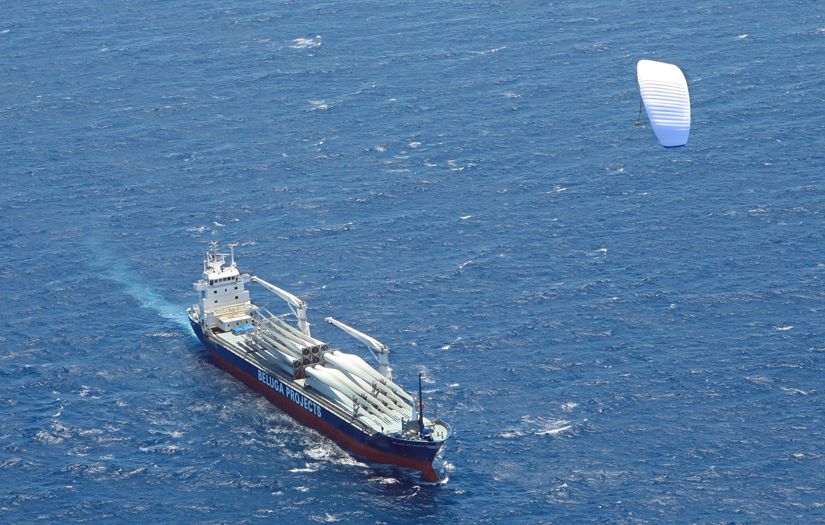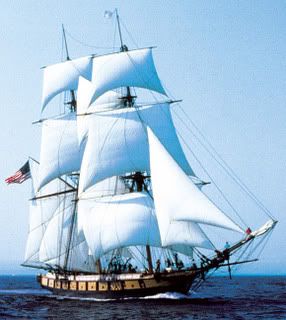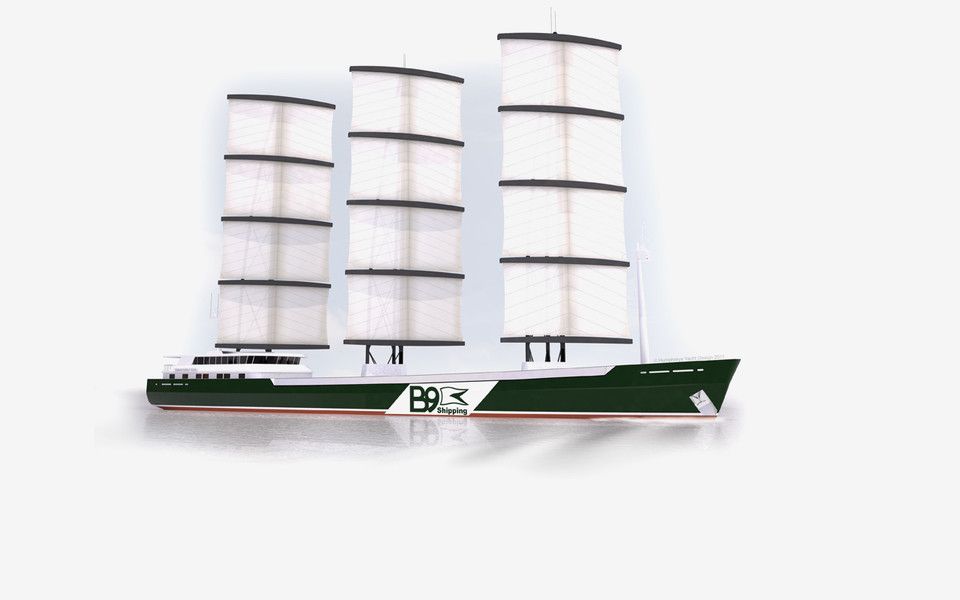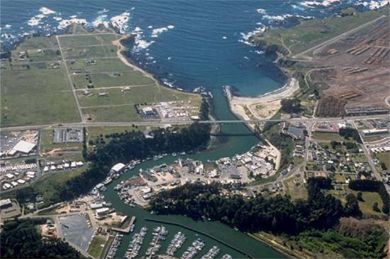 | |
| Only 5 in use...for now. |
There are starting to be cargo ships that deploy kite sails for the appropriate times to cut fuel consumption 15-25%, but that's a half measure. We are living in a time where its entirely possible that we will personally witness the return of the age of sail. Sail with GPS, electric winches, carbon fiber sails and masts, and pumped ballast systems so sailing is a lot safer than its ever been before. This is a good thing, since we know how sailing vessels work and every graduate of the US Naval Academy is required to get degrees in both electrical engineering and naval architecture (ship building) prior to graduation. That means there's a lot of potential ship captains and designers floating around in the world. Automation also means that crews are smaller so modern crewing requirements are pretty similar. We also have solar panels to generate power for refrigeration, radios, and reverse osmosis or distillation setups for fresh drinking water. You can still get flipped over by a rogue wave or a squall, but sailing is a lot less troublesome than it used to be. While conflict with China over domination of the seas and piracy remain concerns for the industry, these problems are just additional risks to consider. Overall sailing is going to be a good career.
 | |
| Old School |
I can easily predict returns of the routes along the Eastern Pacific from Chile to Alaska and back and many stops in between, as well as the old ferry services on the California coast, and construction of sail-driven fishing fleet. Combine electric winches with triangular sails and its a great deal more challenging to catch sardines off Big Sur or near Vancouver Island or the coast of Peru where the upwelling currents have famously driven schools of fish onto the beaches. We may turn up our noses but dried and powdered sardines were a staple food in Pre-Colombian cultures. That doesn't sound very appealling to me, but canned sardines are what they served on English tables at the end of the 19th Century. The English have been all about seafood for centuries, thanks to having a lot of problems growing enough protein on their soil. Records of Cod catches have proven invaluable for determining ocean temperatures off of Iceland for the last 1200 years. Local fishing sailing ships combined with onboard freezers means almost modern convenience, which means it really can be done.
 |
| Automation is key. |
I'm sure we'd like to retain access to chocolate and coffee, which cargo sailing ships can provide. We'll pay more, but we'll still have them in our diets. This is a good thing, because it means we don't see an major cliff to international trade after all. A decrease, at first, while the ships are constructed and crews trained to operate and think about sailing, using the available winds rather than point the ship and turn on the autopilot, check it again in 10 days kind of sailing done these days. Its not really THAT bad, but its very automated from what I understand.
 |
| Will your mast fit under that bridge? |
The other aspect of this is a return of small ports along our coasts to anchor ships, for loading and offloading cargo and passengers. Small ships can go places the big ones can't, meaning that small harbors stop being eyesores or hobby boat parking and start being commercial centers again. That means jobs in places that largely died 50 years ago. Jobs for construction workers contracted to rebuild the needed structures and warehouses. Jobs for local longshoremen and ticket sellers and customs inspectors. Jobs for boat construction and maintenance. Jobs retrofitting ships with sails. Welding can do some amazing things. Boat pilots and small vessels for transferring cargo from ships offshore to the port itself can eventually be replaced with a proper pier and dockside. Picture the Santa Monica Pier with the amusement park cleared away, with the pilings inspected and reinforced, overhead cranes for lifting shipping containers on and off the ships, and with schooners anchored alongside offloading and loading cargo for LA. Maybe they'll build a new pier instead, or maybe Long Beach harbor will just get busier.
It will be hard for the Coasties to adjust to the idea they're living in an industrial area now rather than an expensive oceanfront view they think they own, but they'll deal with it. Rebuilding piers back to function instead of tourist attractions will be expensive and time consuming, but it will also be necessary. Someday there may be working fish canneries on Cannery Row once more. Or maybe they'll just pick some other harbor on the coast that's a bit less stuck up and has an available work force willing to do the job. Eureka has a fish cannery, but shipping out the canned fish will require either the railroad put back into operation or a cargo ship. They'll probably do both.
Sailing the coast of California back and forth, carrying passengers, vehicles, mail, lumber, and canned fish will be an amusing career as well. Operating a seagoing ferry won't be like crossing the calm waters of a bay. You get weather out there. You also might find yourself with a cargo of cattle or horses on one half of the deck, electric cars the other, and passengers loitering above. Being a ferry captain is a challenging job.
It will be cheaper to run ferries up and down the coast than it will be to keep 101 maintained and paved with asphalt, particularly since the tar could be refined into gasoline with a much higher profit margin. The refineries are already doing this. The oil they're getting from Mexico and Saudi Arabia is very sulfur rich as it is, which produces a lot more corrosion during refining and causes more accidents, thus higher environmental standards, thus increasing cost. You can't stay in business unless your product sells for max value, so don't count on paved roads lasting much longer. Travel by rail and sea are going to be a lot more comfortable than dusty gravel roads.
Soon European college tourists will come sail to America and ride the rails with backpacks to have adventures. A reverse of American college tourists doing the same in Europe. Whether they work passage in the galley or book passage on a more comfortable ship is up to how adventurous they are. We're going to live in times surreally familiar to Jack London and Robert Louis Stephenson. And I haven't even gotten to the Civilian Conservation Corps rebuilding projects. Oh, what times we'll see!
No comments:
Post a Comment